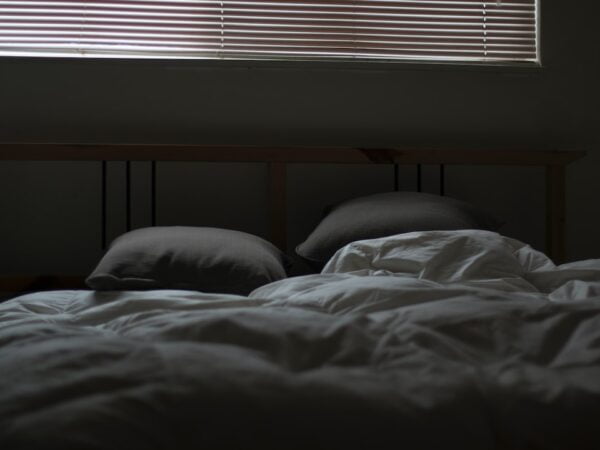
The Importance of Restful Sleep: How to Achieve a Better Night’s Rest
Sleep is an essential part of our daily lives, yet it is often overlooked and undervalued. Many people prioritize work, socializing, and other activities over getting a good night’s sleep. However, the truth is that restful sleep is crucial for our overall health and well-being.
When we sleep, our bodies go through different stages of sleep, each with its own purpose and benefits. These stages include light sleep, deep sleep, and REM (rapid eye movement) sleep. During these stages, our bodies repair and rejuvenate themselves, allowing us to wake up feeling refreshed and ready to take on the day.
Unfortunately, many people suffer from sleep deprivation, which can have serious consequences for their health. According to the Centers for Disease Control and Prevention (CDC), about one-third of adults in the United States do not get enough sleep on a regular basis. This lack of sleep can lead to a wide range of health problems, including obesity, diabetes, heart disease, and mental health disorders.
Key Takeaways
- Restful sleep is crucial for overall health and well-being.
- Understanding the different stages of sleep can help improve sleep quality.
- Poor sleep can have negative effects on both physical and mental health.
- Creating a sleep-friendly environment and establishing a consistent sleep routine can improve sleep quality.
- Diet, exercise, technology use, and natural remedies can all impact sleep quality, and seeking professional help may be necessary for those with sleep disorders.
The Science of Sleep: Understanding the Different Stages of Sleep
To understand why restful sleep is so important, it’s essential to understand the different stages of sleep. When we fall asleep, we go through a cycle that includes both non-REM (NREM) and REM sleep.
During NREM sleep, our bodies relax and our brain waves slow down. This stage is divided into three phases: N1, N2, and N3. N1 is the lightest stage of sleep, where we may still be somewhat aware of our surroundings. N2 is a deeper stage of sleep where our body temperature drops and our heart rate slows down. N3 is the deepest stage of sleep where our muscles relax completely, and our body repairs itself.
After going through the NREM stages, we enter REM sleep. This is the stage where most dreaming occurs. During REM sleep, our brain activity increases, and our eyes move rapidly. This stage is crucial for memory consolidation and learning. It is also believed to play a role in emotional processing and regulation.
The Consequences of Poor Sleep: The Negative Effects on Your Physical and Mental Health
When we don’t get enough restful sleep, it can have serious consequences for our physical and mental health. Sleep deprivation has been linked to a wide range of health problems, including obesity, diabetes, heart disease, and mental health disorders.
One of the reasons why sleep deprivation can lead to weight gain is because it affects our hormones that regulate hunger and fullness. When we don’t get enough sleep, our levels of the hormone leptin, which suppresses appetite, decrease, while our levels of the hormone ghrelin, which stimulates appetite, increase. This can lead to overeating and weight gain.
Sleep deprivation has also been linked to an increased risk of developing diabetes. Lack of sleep affects our body’s ability to regulate blood sugar levels, leading to insulin resistance and an increased risk of developing type 2 diabetes.
In addition to physical health problems, sleep deprivation can also have a negative impact on our mental health. Studies have shown that lack of sleep is associated with an increased risk of developing depression, anxiety, and mood disorders. Sleep deprivation can also worsen symptoms in people who already have these conditions.
Tips for Better Sleep: Creating a Sleep-Friendly Environment
| Tip | Description |
|---|---|
| Keep your bedroom cool | Set your thermostat to a cool temperature, between 60 and 67 degrees Fahrenheit, to help your body prepare for sleep. |
| Eliminate noise | Use earplugs or a white noise machine to block out any unwanted sounds that may disturb your sleep. |
| Reduce light | Use blackout curtains or an eye mask to block out any light that may interfere with your sleep. |
| Invest in a comfortable mattress and pillows | Choose a mattress and pillows that provide the right amount of support and comfort for your body. |
| Avoid electronics before bed | Avoid using electronic devices, such as smartphones and tablets, before bed as the blue light emitted can interfere with your sleep. |
| Create a relaxing atmosphere | Use calming scents, such as lavender, and play soothing music to create a relaxing atmosphere in your bedroom. |
Creating a sleep-friendly environment is essential for getting a good night’s sleep. There are several factors to consider when setting up your bedroom for optimal sleep.
Firstly, temperature plays a crucial role in sleep quality. The National Sleep Foundation recommends keeping your bedroom temperature between 60 and 67 degrees Fahrenheit (15-19 degrees Celsius) for optimal sleep. This temperature range helps to promote the natural drop in body temperature that occurs during sleep.
Lighting is another important factor to consider. Exposure to bright light, especially blue light emitted by electronic devices, can interfere with our body’s natural sleep-wake cycle. It is recommended to keep your bedroom as dark as possible by using blackout curtains or wearing an eye mask. Additionally, it is advisable to avoid using electronic devices, such as smartphones and tablets, for at least an hour before bed.
Noise can also disrupt sleep. If you live in a noisy environment, consider using earplugs or a white noise machine to drown out the sounds. Alternatively, you can use a fan or a humidifier that produces a soothing sound to help you fall asleep.
Establishing a Sleep Routine: The Importance of Consistency
Establishing a consistent sleep routine is crucial for getting restful sleep. Our bodies thrive on routine and having a set bedtime and wake-up time can help regulate our internal clock and improve sleep quality.
It is recommended to go to bed and wake up at the same time every day, even on weekends. This consistency helps to regulate our body’s natural sleep-wake cycle, making it easier to fall asleep and wake up feeling refreshed.
In addition to setting a consistent bedtime and wake-up time, it is also important to establish a relaxing pre-sleep routine. This can include activities such as reading a book, taking a warm bath, or practicing relaxation techniques like deep breathing or meditation. Avoiding stimulating activities and screens before bed can help signal to your body that it’s time to wind down and prepare for sleep.
The Role of Diet and Exercise in Sleep Quality
Diet and exercise play a significant role in sleep quality. What we eat and how active we are during the day can impact our ability to fall asleep and stay asleep at night.
Certain foods and beverages can interfere with sleep. It is best to avoid consuming caffeine, nicotine, and alcohol close to bedtime, as they can disrupt sleep patterns. Caffeine is a stimulant that can stay in your system for several hours, so it is advisable to avoid consuming it at least six hours before bed. Nicotine is also a stimulant that can interfere with sleep, so it is best to avoid smoking or using nicotine products close to bedtime. While alcohol may initially make you feel drowsy, it can disrupt the later stages of sleep, leading to poor sleep quality.
On the other hand, there are foods that can promote better sleep. Foods rich in tryptophan, such as turkey, chicken, nuts, and seeds, can help increase the production of serotonin and melatonin, hormones that regulate sleep. Additionally, foods high in magnesium, such as leafy greens, legumes, and whole grains, can help relax muscles and promote better sleep.
Exercise has also been shown to improve sleep quality. Regular physical activity can help reduce stress and anxiety, which are common causes of sleep problems. It is important to note that exercising too close to bedtime can have the opposite effect and make it harder to fall asleep. It is best to finish your workout at least a few hours before bed to allow your body time to wind down.
The Impact of Technology on Sleep: How to Minimize Disruptions
Technology has become an integral part of our lives, but it can also have a negative impact on our sleep. The blue light emitted by electronic devices such as smartphones, tablets, and computers can interfere with our body’s natural sleep-wake cycle.
Exposure to blue light suppresses the production of melatonin, a hormone that regulates sleep. This can make it harder to fall asleep and stay asleep at night. It is recommended to avoid using electronic devices for at least an hour before bed to allow your body time to wind down and prepare for sleep.
If you must use electronic devices before bed, consider using blue light filters or wearing blue light-blocking glasses. These tools can help reduce the amount of blue light that reaches your eyes, making it easier to fall asleep.
Natural Remedies for Sleep: Herbal Supplements and Essential Oils
Many people turn to natural remedies to help improve their sleep. Herbal supplements and essential oils are popular choices for promoting relaxation and better sleep.
Chamomile tea is a well-known herbal remedy for sleep. It contains compounds that have a calming effect on the body, helping to promote relaxation and better sleep. Other herbal supplements that are commonly used for sleep include valerian root, lavender, and passionflower.
Essential oils can also be used to promote better sleep. Lavender essential oil, in particular, has been shown to have a calming effect on the body and can help improve sleep quality. It can be diffused in the bedroom or applied topically to the skin before bed.
While natural remedies can be effective for some people, it is important to note that they may not work for everyone. It is always best to consult with a healthcare professional before starting any new supplements or using essential oils, especially if you have any underlying health conditions or are taking medications.
When to Seek Professional Help: Recognizing Sleep Disorders and Seeking Treatment
While occasional sleep disturbances are normal, persistent sleep problems may be a sign of an underlying sleep disorder. Common sleep disorders include insomnia, sleep apnea, restless leg syndrome, and narcolepsy.
Insomnia is characterized by difficulty falling asleep or staying asleep. It can be caused by various factors, including stress, anxiety, and medical conditions. If you consistently have trouble sleeping for more than a few weeks, it may be time to seek professional help.
Sleep apnea is a condition where breathing repeatedly stops and starts during sleep. It can lead to fragmented sleep and daytime fatigue. If you snore loudly and frequently wake up gasping for air, it is important to consult with a healthcare professional.
Restless leg syndrome is a neurological disorder characterized by an irresistible urge to move the legs, especially at night. It can cause discomfort and disrupt sleep. If you experience an uncomfortable sensation in your legs that is relieved by movement, it may be worth discussing with a healthcare professional.
Narcolepsy is a neurological disorder that causes excessive daytime sleepiness and sudden episodes of sleep. If you consistently feel excessively sleepy during the day or have sudden episodes of sleep, it is important to seek medical attention.
If you suspect that you may have a sleep disorder, it is important to consult with a healthcare professional who specializes in sleep medicine. They can help diagnose and treat your condition, allowing you to get the restful sleep you need.
Prioritizing Restful Sleep for a Healthier, Happier Life
In conclusion, restful sleep is crucial for our overall health and well-being. It plays a vital role in physical and mental health, memory consolidation, and learning. Poor sleep can have serious consequences for our health, including an increased risk of obesity, diabetes, heart disease, depression, anxiety, and mood disorders.
Creating a sleep-friendly environment, establishing a consistent sleep routine, and prioritizing diet and exercise can all help improve sleep quality. Minimizing disruptions from technology and exploring natural remedies can also be beneficial. However, if sleep problems persist or are accompanied by other symptoms, it may be necessary to seek professional help.
By prioritizing restful sleep and seeking help when needed, we can improve our overall health and well-being. So make sure to make sleep a priority in your life and reap the benefits of a healthier, happier life.
FAQs
What is restful sleep?
Restful sleep is a state of sleep where the body and mind are completely relaxed, allowing for a deep and uninterrupted sleep. It is characterized by a feeling of refreshment and rejuvenation upon waking up.
Why is restful sleep important?
Restful sleep is important for overall health and well-being. It helps to improve memory, concentration, and productivity, as well as reduce stress and anxiety. It also plays a crucial role in maintaining a healthy immune system and preventing chronic diseases.
What are some tips for achieving restful sleep?
Some tips for achieving restful sleep include establishing a regular sleep schedule, creating a relaxing bedtime routine, avoiding caffeine and alcohol before bedtime, keeping the bedroom cool and dark, and avoiding electronic devices before bedtime.
What are some common sleep disorders that can affect restful sleep?
Some common sleep disorders that can affect restful sleep include insomnia, sleep apnea, restless leg syndrome, and narcolepsy. These disorders can disrupt the sleep cycle and prevent the body from achieving restful sleep.
When should I seek medical help for sleep problems?
If you are experiencing persistent sleep problems that are affecting your daily life, such as excessive daytime sleepiness, difficulty concentrating, or mood changes, you should seek medical help. A healthcare professional can help diagnose and treat any underlying sleep disorders that may be affecting your restful sleep.


















